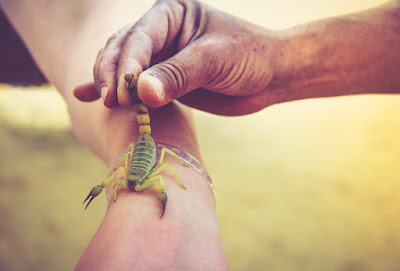What happens if scorpion bites you?
Scorpion stings can be painful, but in most cases, they will not cause any major complications. What a person should do after a scorpion sting depends on the type of scorpion and the symptoms that follow.
 |
| What to do after a scorpion bites you |
If a person experiences any of the following symptoms after a scorpion sting, they need immediate medical attention:
- difficulty breathing
- drooling
- difficulty swallowing
- seizures or muscle jerking
- hives and swelling over the body
- difficulty standing
- unconsciousness
According to the Centers for Disease Control and Prevention (CDC), experiencing a sting from the bark scorpion can cause life threatening complications.
What to Do
The CDC recommends that adults take the following steps if a scorpion stings them:
- Contact a healthcare provider or Poison Control for instructions and advice related to the sting.
- Apply ice to the sting site to help with pain and swelling.
- Remain calm and relaxed.
- Avoid taking any sort of sedative.
According to Seattle Children’s Hospital, if a scorpion stings a child, what a parent or caregiver should do depends on their reaction to the sting.
For example, they recommend self-care if mild symptoms — such as pain, numbness, or tingling — occur only around the site of the sting.
However, if a parent or caregiver is concerned, or if the child’s last tetanus shot was more than 10 years ago, they should inform a doctor of the sting.
They may also want to call a doctor if skin flushing starts to spread after 24 hours from the sting.
A person should call emergency services if an adult or child experiences the following:
- muscle jerking or spasms
- difficulty swallowing
- drooling
- leg weakness
- unconsciousness
- difficulty breathing
- swelling or hives over the body
According to Poison Control, those with the highest risk of developing severe symptoms are young children.
Treatment
Treatment varies based on the species of scorpion that stung the person. However, if in doubt, a person should seek medical care as soon as possible.
For mild symptoms, such as pain and numbness at the site of the sting, a person may not need much care. They may wish to perform self-care that involves:
- cleaning the area around the sting
- applying a cold pack or compress
- taking ibuprofen or acetaminophen for pain relief
The Food and Drug Administration (FDA) suggests elevating the affected body part so that it is at the same level as the heart.
However, if a more dangerous species — such as a bark scorpion — stings a person, treatment will vary depending on the severity of sting:
Grade 1
This means that pain, swelling, and other symptoms are limited to the area of the sting. This only requires pain management.
Grade 2
There is pain and some paralysis at or near the site and closer to where the limb connects to the body.
Treatment often includes pain management and may involve antianxiety medication.
Grade 3
This can include all the symptoms of grade 2, alongside flailing limbs and an arching back (skeletal neuromuscular dysfunction) or increased saliva production, blurry vision, and rapid movement of the tongue (cranial nerve issues).
Treatment includes the use of pain relievers, anxiety medications, and antivenom.
Grade 4
A person will experience both skeletal neuromuscular dysfunction and cranial nerve issues, as well as organ failure, hyperthermia, or pulmonary edema.
Antivenom is critical for people experiencing these symptoms. However, according to Poison Control, many hospitals do not stock the antivenom, and it can be very expensive.
Symptoms
For most stings, symptoms will consist of mostly local reactions to the sting. Fewer than 10% of all scorpion stings will cause severe symptoms.
Young children and older adults are most likely to develop life threatening reactions to a sting.
Around 85% of bark scorpion stings cause only a mild, local reaction. About 10% cause waves of pain in the legs or arms, and around 5% cause serious symptoms.
Mild symptoms of a scorpion sting may include:
- tingling, pain, or numbness at the site of the sting
- limited or no swelling
- limited or no skin flushing
- tingling, pain, or numbness that travels up the arm or leg
- symptoms that typically only last for about 24 hours
If serious symptoms occur, they will develop within 2–3 hours of the sting. The first serious symptom may be rapid eye movements or muscle twitching.
Other serious symptoms and complications may include:
- jerky eye movements
- blurry vision
- muscle twitching
- difficulty breathing
- difficulty swallowing
- slurred speech
Complications
- high body temperatures
- pulmonary edema
- multiple organ failure
- rhabdomyolysis, which occurs when the muscle tissues break down and release a protein called myoglobin into the blood
Prevention
- Wear leather gloves.
- Wear long sleeves.
- Shake out clothing, shoes, and boots before putting them on.
- A person should also carry an epinephrine auto-injector if they have a history of allergic reactions to insect bites or stings.
